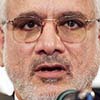| . |  |
. |
Beijing (AFP) Nov 09, 2005 The United States brushed aside North Korea's fresh proposal to abandon its nuclear arms Wednesday as six-nation disarmament talks resumed here with sharp differences remaining between the two Cold War foes. Chief US delegate Christopher Hill said North Korea put forward unspecified steps to rid itself of nuclear weapons and nuclear programs in exchange for energy aid, security guarantees and other benefits. "I think that the DPRK (North Korea) needs to understand that we need to move swiftly on denuclearization and the fact that denuclearization is the first step in the agreement," Hill told reporters. The two Koreas, the United States, China, Russia and Japan convened the fifth round of the talks following their September 19 agreement on principles in the disarmament-for-benefits deal. Progress in the 27-month-old talks has stalled over sharp differences about who does what first. "I think the DPRK has a much more deliberately slower process of how to handle denuclearization," Hill added after having a one-on-one dinner with his North Korean counterpart Kim Gye-Gwan that followed a flurry of plenary and bilateral contacts on the first day of the new six-nation round. North Korea insisted it was ready to give up its nuclear programs and weapons in phases on condition it was provided with a light-water reactor, Japan's Kyodo news agency reported quoting a negotiation source. "They (North Korea) introduced some elements that are not in the agreed principles" and that "we are not able to work with," Hill said. "On the other hand, they showed a willingness to move forward to figure out how to implement principles." The US undersecretary of state pointed out that a nuclear reactor, which could produce weapons-grade plutonium, had continued to operate even after the basic agreement. "In a sense, the problem got worse since September 19." South Korea, Japan and China proposed discussions in three categories to move the talks forward. But the United States was skeptical. "We don't want to get into protracted discussions on who takes what steps first and how we calibrate each step," Hill said, adding that the six nations should rather "sort out things boldly about how we can make some important steps forward." South Korea's chief delegate Song Min-soon said he proposed to put the implementation plan into three categories -- "the dismantling of North Korea's nuclear program, the economic cooperation and energy aid for North Korea and the normalization of relations between the countries concerned." Japan further said the talks should be broken down into working-level groups to discuss the three categories. It was unclear if North Korea would accept the proposals. "North Korea did not single out the issues one-by-one but came up with a rudimentary opinion about the issue of a light-water nuclear reactor and the process of dismantling the nuclear program," Song said. North Korea insisted immediately after the September accord that it would not disarm unless the United States first supplied it with a light-water nuclear reactor to generate electricity. Hill maintained his nation's policy Wednesday that the North must first rejoin the Nuclear Non-Proliferation Treaty (NPT) and accept inspections by the UN International Atomic Energy Agency (IAEA). North Korea has adopted a typically angry stance on the eve of the meeting by claiming Bush had slandered its leader Kim Jong-Il this week as a "tyrant." "What he uttered is a blatant violation of the spirit of the joint statement of the six-party talks which calls for 'respect for sovereignty' and 'peaceful co-existence,'" a North Korean foreign ministry spokesman said. The nuclear crisis flared in October 2002 after the United States accused North Korea of running a secret uranium-enrichment program. The North responded by throwing out weapons inspectors and leaving the NPT. On day two of the talks due to last three days, a plenary session is scheduled to begin at 10:00 am (0200 GMT), South Korea's Song said. The second phase of the fifth round of talks is due to be held in December. Related Links SpaceDaily Search SpaceDaily Subscribe To SpaceDaily Express  Tehran (AFP) Nov 09, 2005
Tehran (AFP) Nov 09, 2005Iran will carry on with its nuclear programme whatever the circumstances, the head of the country's atomic energy agency said on Wednesday, adding that "we have got past the stage of threats." |
|
| The content herein, unless otherwise known to be public domain, are Copyright 1995-2006 - SpaceDaily.AFP and UPI Wire Stories are copyright Agence France-Presse and United Press International. ESA PortalReports are copyright European Space Agency. All NASA sourced material is public domain. Additionalcopyrights may apply in whole or part to other bona fide parties. Advertising does not imply endorsement,agreement or approval of any opinions, statements or information provided by SpaceDaily on any Web page published or hosted by SpaceDaily. Privacy Statement |